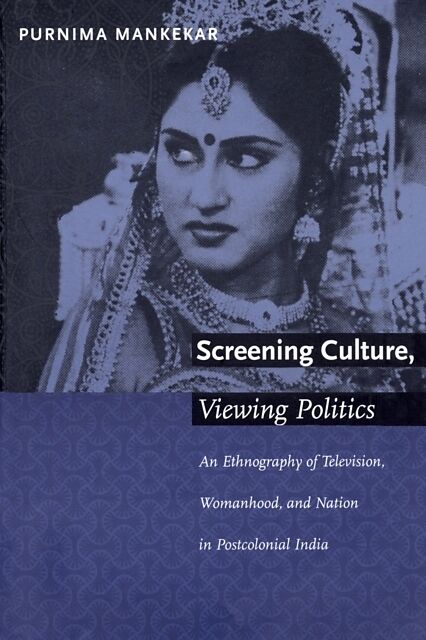Screening Culture, Viewing Politics: An Ethnography of Television, Womanhood, and Nation in Postcolonial India
Einband:
Kartonierter Einband
EAN:
9780822323907
Untertitel:
An Ethnography of Television, Womanhood, Nation in Postcolonial
Genre:
Kunst
Autor:
Purnima Mankekar
Herausgeber:
Duke University Press
Auflage:
New
Anzahl Seiten:
448
Erscheinungsdatum:
01.12.1999
ISBN:
978-0-8223-2390-7
Informationen zum Autor Purnima Mankekar Klappentext In Screening Culture, Viewing Politics Purnima Mankekar presents a cutting-edge ethnography of television-viewing in India. With a focus on the responses of upwardly-mobile, yet lower-to-middle class urban women to state-sponsored entertainment serials, Mankekar demonstrates how television in India has profoundly shaped women's place in the family, community, and nation, and the crucial role it has played in the realignment of class, caste, consumption, religion, and politics.Mankekar examines both "entertainment" narratives and advertisements designed to convey particular ideas about the nation. Organizing her study around the recurring themes in these shows-Indian womanhood, family, community, constructions of historical memory, development, integration, and sometimes violence-Mankekar dissects both the messages televised and her New Delhi subjects' perceptions of and reactions to these messages. In the process, her ethnographic analysis reveals the texture of these women's daily lives, social relationships, and everyday practices. Throughout her study, Mankekar remains attentive to the tumultuous historical and political context in the midst of which these programs' integrationalist messages are transmitted, to the cultural diversity of the viewership, and to her own role as ethnographer. In an enlightening epilogue she describes the effect of satellite television and transnational programming to India in the 1990s.Through its ethnographic and theoretical richness, Screening Culture, Viewing Politics forces a reexamination of the relationship between mass media, social life, and identity and nation formation in non-Western contexts. As such, it represents a major contribution to a number of fields, including media and communication studies, feminist studies, anthropology, South Asian studies, and cultural studies. Zusammenfassung With a focus on the responses of upwardly-mobile! yet lower-to-middle class urban women to state-sponsored entertainment serials! this title demonstrates how television in India has profoundly shaped women's place in the family! community! and nation! and the crucial role it has played in the realignment of class! caste! religion! and politics. Inhaltsverzeichnis Acknowledgments ix 1. Culture Wars 1 Part 1: Fields of Power: The National Television Family 2. National Television and the Viewing Family 45 3. Women-Oriented Narratives and the New Indian Woman 104 Part II: Engendering Communities 4. Mediating Modernities: The Ramayan and the Creation of Community and Nation 165 5. Television Tales, National Narratives, and a Woman's Rage: Multiple Interpretations of Draupadi's Disrobing 224 Part III: Technologies of Violence 6. Air Force Women Don't Cry: Militaristic Nationalism and Representations of Gender 259 7. Popular Narrative, the Politics of Location, and Memory 289 Epilogue: Sky Wars 335 Notes 359 Bibliography 395 Index 417...
Autorentext
Purnima Mankekar
Klappentext
In Screening Culture, Viewing Politics Purnima Mankekar presents a cutting-edge ethnography of television-viewing in India. With a focus on the responses of upwardly-mobile, yet lower-to-middle class urban women to state-sponsored entertainment serials, Mankekar demonstrates how television in India has profoundly shaped women's place in the family, community, and nation, and the crucial role it has played in the realignment of class, caste, consumption, religion, and politics. Mankekar examines both "entertainment" narratives and advertisements designed to convey particular ideas about the nation. Organizing her study around the recurring themes in these shows-Indian womanhood, family, community, constructions of historical memory, development, integration, and sometimes violence-Mankekar dissects both the messages televised and her New Delhi subjects' perceptions of and reactions to these messages. In the process, her ethnographic analysis reveals the texture of these women's daily lives, social relationships, and everyday practices. Throughout her study, Mankekar remains attentive to the tumultuous historical and political context in the midst of which these programs' integrationalist messages are transmitted, to the cultural diversity of the viewership, and to her own role as ethnographer. In an enlightening epilogue she describes the effect of satellite television and transnational programming to India in the 1990s. Through its ethnographic and theoretical richness, Screening Culture, Viewing Politics forces a reexamination of the relationship between mass media, social life, and identity and nation formation in non-Western contexts. As such, it represents a major contribution to a number of fields, including media and communication studies, feminist studies, anthropology, South Asian studies, and cultural studies.
Zusammenfassung
With a focus on the responses of upwardly-mobile, yet lower-to-middle class urban women to state-sponsored entertainment serials, this title demonstrates how television in India has profoundly shaped women's place in the family, community, and nation, and the crucial role it has played in the realignment of class, caste, religion, and politics.
Inhalt
Acknowledgments ix
1. Culture Wars 1
Part 1: Fields of Power: The National Television Family
2. National Television and the “Viewing Family” 45
3. “Women-Oriented” Narratives and the New Indian Woman 104
Part II: Engendering Communities
4. Mediating Modernities: The Ramayan and the Creation of Community and Nation 165
5. Television Tales, National Narratives, and a Woman’s Rage: Multiple Interpretations of Draupadi’s “Disrobing” 224
Part III: Technologies of Violence
6. “Air Force Women Don’t Cry”: Militaristic Nationalism and Representations of Gender 259
7. Popular Narrative, the Politics of Location, and Memory 289
Epilogue: Sky Wars 335
Notes 359
Bibliography 395
Index 417

Leider konnten wir für diesen Artikel keine Preise ermitteln ...
billigbuch.ch sucht jetzt für Sie die besten Angebote ...
Die aktuellen Verkaufspreise von 6 Onlineshops werden in Realtime abgefragt.
Sie können das gewünschte Produkt anschliessend direkt beim Anbieter Ihrer Wahl bestellen.
Loading...
Die aktuellen Verkaufspreise von 6 Onlineshops werden in Realtime abgefragt.
Sie können das gewünschte Produkt anschliessend direkt beim Anbieter Ihrer Wahl bestellen.
| # | Onlineshop | Preis CHF | Versand CHF | Total CHF | ||
|---|---|---|---|---|---|---|
| 1 | Seller | 0.00 | 0.00 | 0.00 |
